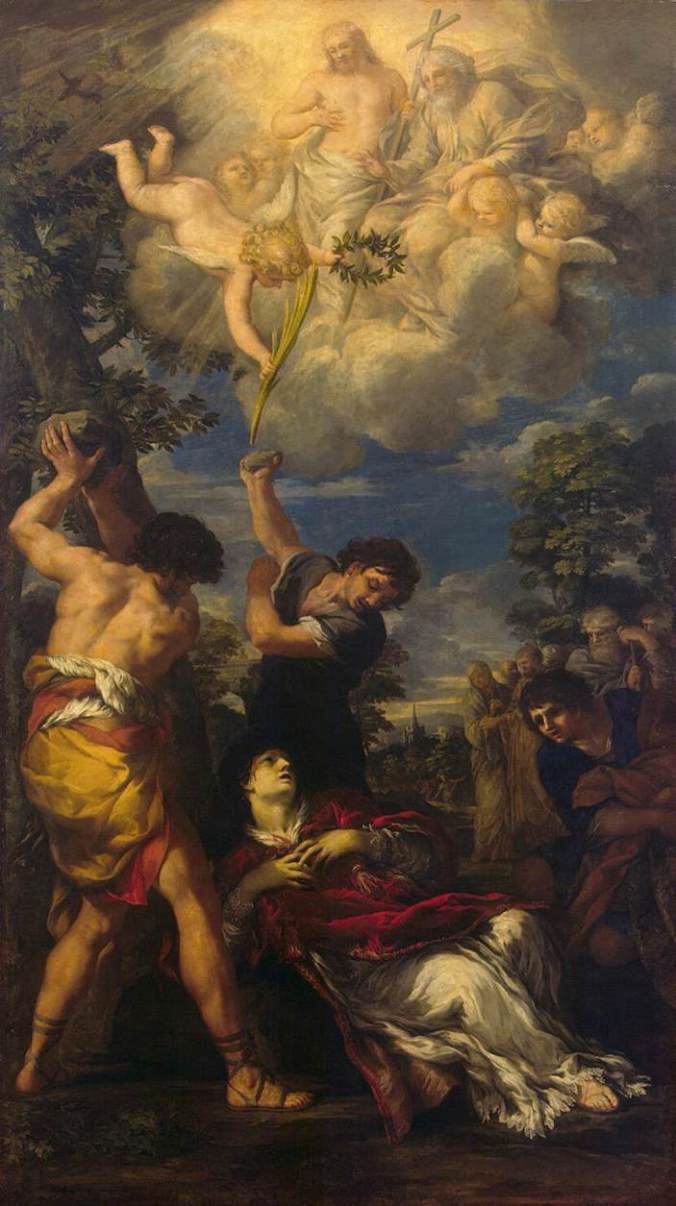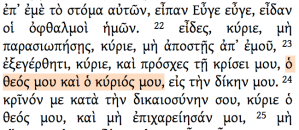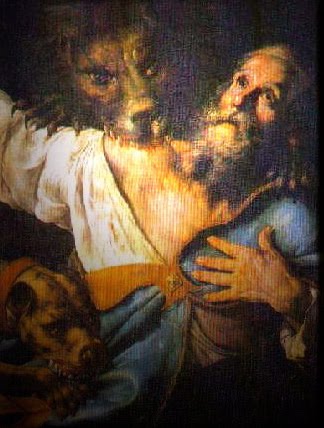
Ignatius (ca. 30-107 A.D), a bishop of Antioch, Syria, a friend of Polycarp, familiar with the Apostles and Paul, and a martyr(Rome c. 107 A.D.), is one of my favorite apostolic fathers (I would encourage Christians to read his letters). In this post, I shared Ignatius understanding of who Christ Jesus is. I went through all his known letters collecting the explicit affirmation of Christ Jesus’ identity to helps us answer the question posed on the title: Is Christ Jesus God?
In the opening of his letter to the Ephesians, Ignatius wrote:
Ignatius, who is also called Theophorus, to the Church which is at Ephesus, in Asia, deservedly most happy, being blessed in the greatness and fulness of God the Father, and predestinated before the beginning of time, that it should be always for an enduring and unchangeable glory, being united and elected through the true passion by the will of the Father, and Jesus Christ, our God: Abundant happiness through Jesus Christ, and His undefiled grace.
Ignatius helps us affirms that ‘his own blood’(Acts 20:28) refer back to ‘God’, thus a powerful evidence of Christ Jesus’ Deity: “the church of God which he purchased with his own blood” in Letter To Ephesians chapter 1.
Being the followers of God, and stirring up yourselves by the blood of God, ye have perfectly accomplished the work which was beseeming to you.
In chapter 7:
There is one Physician who is possessed both of flesh and spirit; both made and not made; God existing in flesh; true life in death; both of Mary and of God; first possible and then impossible,— even Jesus Christ our Lord.
Chapter 18:
For our God, Jesus Christ, was, according to the appointment of God, conceived in the womb by Mary, of the seed of David, but by the Holy Ghost. He was born and baptized, that by His passion He might purify the water.
Ignatius letter to the Trallians:
Chapter 9:
Stop your ears, therefore, when any one speaks to you at variance with Jesus Christ, who was descended from David, and was also of Mary; who was truly born, and did eat and drink. He was truly persecuted under Pontius Pilate; He was truly crucified, and [truly] died, in the sight of beings in heaven, and on earth, and under the earth. He was also truly raised from the dead, His Father quickening Him, even as after the same manner His Father will so raise up us who believe in Him by Christ Jesus, apart from whom we do not possess the true life.
Letter to The Romans (My favorite)
Ignatius, who is also called Theophorus, to the Church which has obtained mercy, through the majesty of the Most High Father, and Jesus Christ, His only-begotten Son; the Church which is beloved and enlightened by the will of Him that willeth all things which are according to the love of Jesus Christ our God, which also presides in the place of the region of the Romans, worthy of God, worthy of honour, worthy of the highest happiness, worthy of praise, worthy of obtaining her every desire, worthy of being deemed holy, and which presides over love, is named from Christ, and from the Father, which I also salute in the name of Jesus Christ, the Son of the Father: to those who are united, both according to the flesh and spirit, to every one of His commandments; who are filled inseparably with the grace of God, and are purified from every strange taint, [I wish] abundance of happiness unblameably, in Jesus Christ our God.
Chapter 3:
Only request in my behalf both inward and outward strength, that I may not only speak, but [truly] will; and that I may not merely be called a Christian, but really be found to be one. For if I be truly found [a Christian], I may also be called one, and be then deemed faithful, when I shall no longer appear to the world. Nothing visible is eternal. “For the things which are seen are temporal, but the things which are not seen are eternal.” For our God, Jesus Christ, now that He is with the Father, is all the more revealed [in His glory]. Christianity is not a thing of silence only, but also of [manifest] greatness.
Chapter 6:
Permit me to be an imitator of the passion of my God.
Letter to the Symrnæans:
Chapter 1:
I GLORIFY God, even Jesus Christ, who has given you such wisdom. For I have observed that ye are perfected in an immoveable faith, as if ye were nailed to the cross of our Lord Jesus Christ, both in the flesh and in the spirit, and are established in love through the blood of Christ, being fully persuaded with respect to our Lord, that He was truly of the seed of David according to the flesh, and the Son of God according to the will and power of God; that He was truly born of a virgin, was baptized by John, in order that all righteousness might be fulfilled by Him; and was truly, under Pontius Pilate and Herod the tetrarch, nailed [to the cross] for us in His flesh. Of this fruit we are by His divinely-blessed passion, that He might set up a standard for all ages, through His resurrection, to all His holy and faithful [followers], whether among Jews or Gentiles, in the one body of His Church.
Chapter 3:
For I know that after His resurrection also He was still possessed of flesh, and I believe that He is so now. When, for instance, He came to those who were with Peter, He said to them, “Lay hold, handle Me, and see that I am not an incorporeal spirit.” And immediately they touched Him, and believed, being convinced both by His flesh and spirit. For this cause also they despised death, and were found its conquerors. And after his resurrection He did eat and drink with them, as being possessed of flesh, although spiritually He was united to the Father.
Letter to Polycarp:
Chapter 3
Be ever becoming more zealous than what thou art. Weigh carefully the times. Look for Him who is above all time, eternal and invisible, yet who became visible for our sakes; impalpable and impassible, yet who became passible on our account; and who in every kind of way suffered for our sakes.
Chapter 8
I pray for your happiness for ever in our God, Jesus Christ, by whom continue ye in the unity and under the protection of God
Is Christ Jesus God? Ignatius of Antioch answers Yes.
With assurance, joy and delight, we join doubting Thomas’ affirmation(John 2028), Christ Jesus is our Lord and our God.
N.B: When we affirm that Jesus is Yahweh, we do not claim him to be the Father. We affirm that the Father, Son, and Holy Spirit are three distinct persons in one and only Yahweh.
Source:
The Ante-Nicene Fathers, Volume I: The Apostolic Fathers with Justin Martyr and Irenaeus. 1885 (A. Roberts, J. Donaldson & A. C. Coxe, Ed.) (p. 49, 52, 57, 69-70, 73,74–75, 76, 86,87, 94 and 96). Buffalo, NY: Christian Literature Company. (The quotes are from the shorted version of Ignatius Letters, emphasis added)







You must be logged in to post a comment.